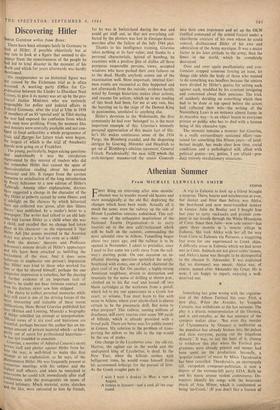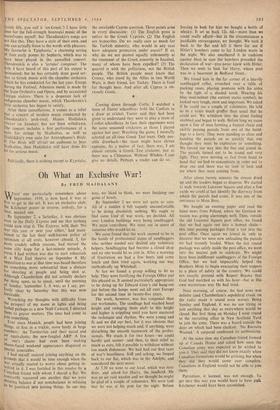Athenian Summer
From MICHAEL LLEWELLYN SMITH
ATHENS
Untsr thing on returning after nine months'
absence was to wander round old haunts and stare nostalgically at the old flat, deploring the changes which have been made. Actually all is much the same; even the railway up the side of Mount Lycabettus remains unfinished. This rail- way—one of the unhappiest inspirations of the National Tourist Organisation—is to carry tourists up to the new cafd/restaurant which will be built on the summit, commanding the most splendid view in Athens. Tunnelling began about two years ago, and the railway is to be opened in November. I admit to prejudice, since I used to live some ten yards away from the rail- way's starting point. On one occasion an in- efficient blasting operation sprinkled the neigh- bourhood with stones, one of which shattered the glass roof of my flat. On another, a highly-strung American neighbour, driven to distraction and insomnia by the noise of drilling at eleven p.m., climbed on to his flat roof and loosed off two blank cartridges at the workmen from a pistol; which led to my one appearance in a Greek law court, as witness. You must learn to live with noise in Athens, where your alarm-clock is almost certain to be the pneumatic drill. But noise to what purpose? This railway, costing millions of drachmas, will carry tourists over some 300 yards of hillside, which is already provided with a broad path. There are better uses for public money in Greece. My solution to the problem of trans- porting the infirm or the idle to the top would be the use of mules.
One change in the Lycabettus area: my old cat, Mattou, the ugliest cat in the world and the undisputed king of Lycabettus, is dead. In the New Year, when the hillside seethes with belligerent toms, he would rouse himself from his accustomed lethargy for the pursuit of love. As the Greek couplet puts it: 1 wish I were a donkey in May, a ram in August, A tomcat in January—and cock all the year round.
A trip to Euboeia to look up a friend brought a surprise. There, hoarse and mischievous as ever, but sleeker and fitter than before, was Aleko, the best-loved and now most-travelled donkey in Greece. Julie du Boulay and I bought him last year to carry rucksacks and provide com- pany in our travels through the White Mountains of Crete. Since then Julie—now sole owner—has spent three months in a remote village in Euboeia. She took Aleko with her all the way from Crete to Euboeia via Peiraeus, a staggering feat even for one experienced in Greek ships. A difliculty arose in Euboeia which we had never met in Crete. Animals are not given saints' names, and Aleko's name was thought to be disrespectful to the obscure St. Alexander. It was explained that no disrespect was meant; Aleko was, of course, named after Alexander the Great. He is now, I am happy to report, enjoying a well- deserved rest.
Something has gone wrong with the organisa- tion of the Athens Festival this year. First, a new play, When the Atreides, by Vangelis Catsanis, was withdrawn at the last moment. The play is a drastic reinterpretation of the Oresteia, and is anti-royalist, as the last sentence of the synopsis makes clear: 'But even this murder (of Clytemnestra by Orestes) is ineffective as the populace has already broken into the palace and slain everyone, paying out the iniquitous dynasty.' It was, to say the least of it, clumsy to withdraw this play when the Festival pro- grammes were already printed and money had been spent on the production. Secondly, a 'popular concert' of music by Mikis Theodorakis has been cancelled. Theodorak is, an enormously tall, outspoken composer-politician, is now a deputy of the extreme-left party EDA. Both he and his music arouse violent controversy. De- tractors identify his songs with the bouzouki music of Asia Minor, which is condemned as being 'un-Greek.' (If you don't like a feature of
Greek life, you call it 'un-Greek.') I have little time for the lull-strength bouzouki music of the waterfronts myself; but Theodorakis's songs are not like this. They have a style of their own, and one can actually listen to the words with pleasure. My favourite is 'Epiphania,' a charming setting of four early poems by Sepheris, which was to have been played in the cancelled concert. Theodorakis is also a 'serious' composer. The little I have heard of this part of his output is Uninspired; but he has certainly done good ser- vice to Greek music with the chamber orchestra Which he has conducted for the last year. Except during the Festival, Athenian music is made by the State Orchestra and Opera, and by occasional foreign visitors. There is a desperate lack of Indigenous chamber music, which Theodorak is's little orchestra has begun to satisfy.
After these cancellations, it comes as a relief that a concert of modern music conducted by Theodorakis's arch-rival, Manes Hadjidakis (Never on Sunday), has not been withdrawn. The concert includes a first performance of a suite for strings by Skalkottas, as well as Hadjidak is's own suite for Aristophanes's Birds. 1,i The Birds will attract an audience to hear Skalkottas, then Hadjidakis will have done his bit for serious music.
Politically, there is nothing except to Kypriako, the inevitable Cyprus question. Three points arise in every discussion : (1) The English press is unfair to the Greek Cypriots. (2) The English are hypocrites. Do we really care so much for the Turkish minority, who would in any case have adequate protection under enosis? If so, why do we not protest equally vehemently at the treatment of the Greek minority in Istanbul, many of whom have been expelled? (3) The quarrel is with the politjcians, not the British people. The British people must know that Greece, who stood by the Allies in two World Wars, is their friend, not Turkey. There is food for thought here. And after all, Cyprus is ob- viously Greek.
Coming down through Corfu, I watched a team of Exeter schoolboys hold the Corfiots to a draw at cricket. Exeter said they had been given to understand they were to play a team of Corfiot schoolboys. In fact, their opponents were the same seasoned cricketers as those I played against last year. Watching the game, I mentally selected an all-time Greek Test team. Only pos- sible drawback—the team might have eleven captains. As a matter of fact, there was, I am almost certain, a Greek Test cricketer, just as there was a Chinaman. Without Wisden, I can give no details. Perhaps a reader can do so.







































 Previous page
Previous page